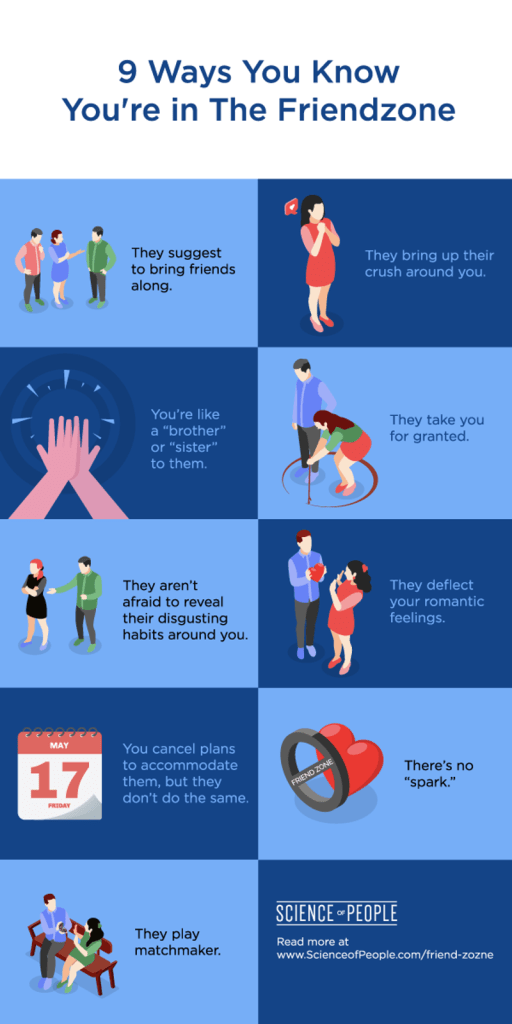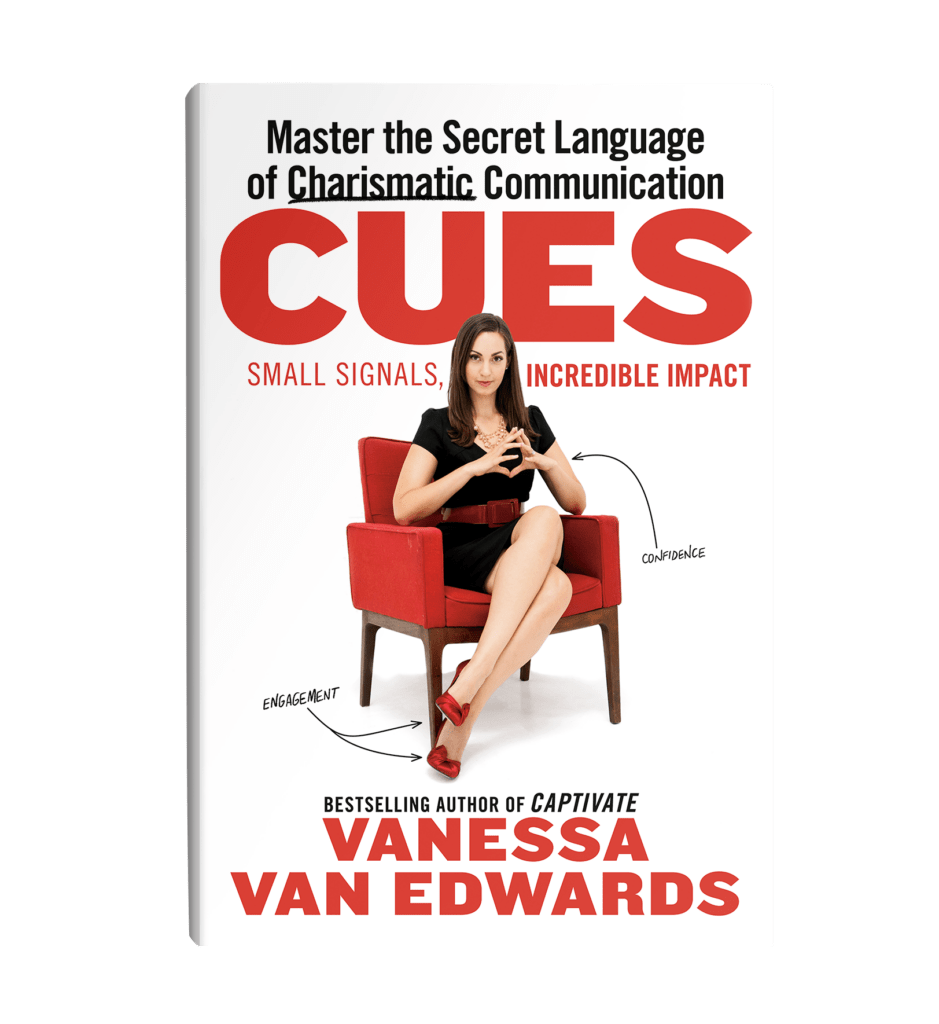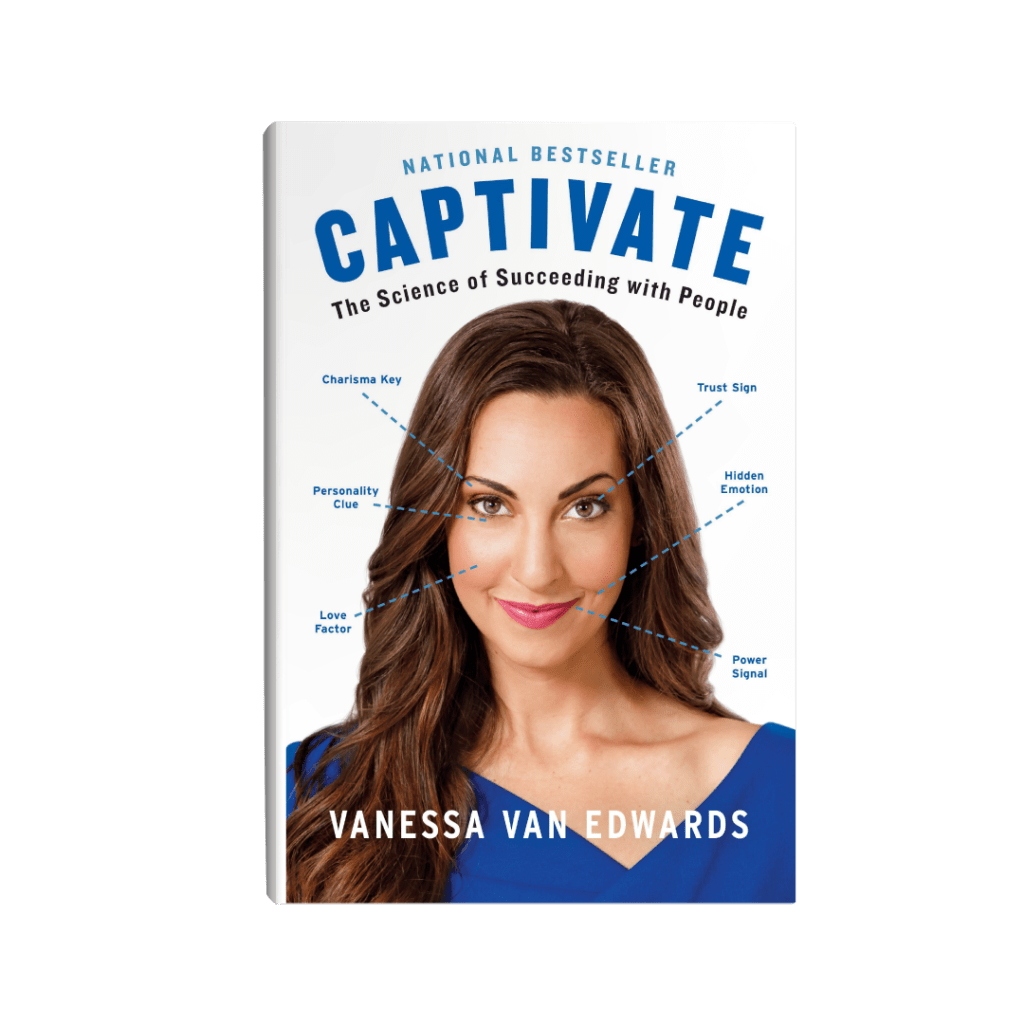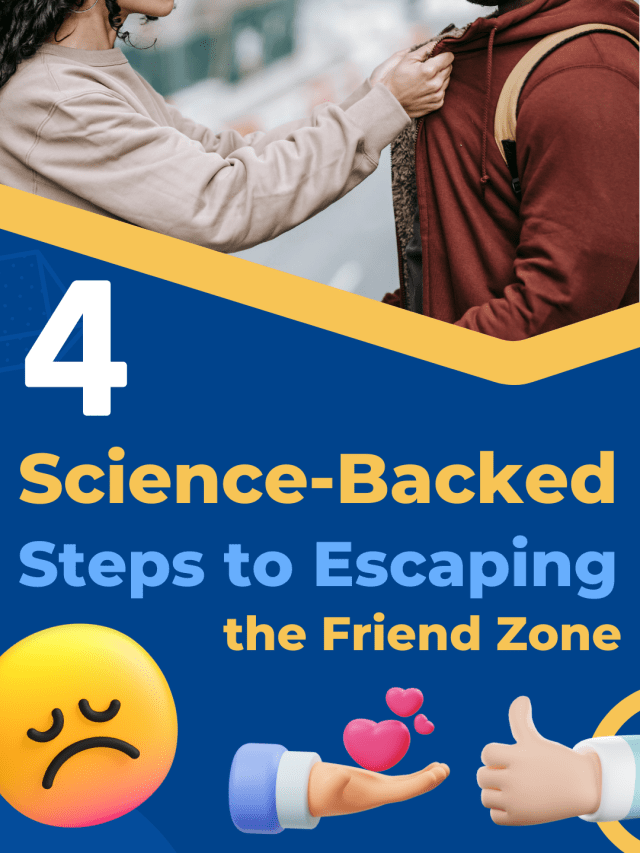The friendzone. This can be torture if you have been friendzoned by your crush! And crushing if you really want to be more than just friends.
In this guide I’m going to show you:
- what the friend zone REALLY is
- 9 surefire signs you’re in the friend zone
- how to escape the friend zone in 4 steps
- what to do to avoid the friend zone (and what to do if you get rejected)
Watch our video below to learn how to get out of the friend zone in 4 steps (with science!):
Let’s dive in!
What is The Friend Zone? (Definition)
The Friend Zone, also known as the “buddy zone” or “non-romantic zone,” is a relationship status between 2 people that is exclusively non-romantic. Usually, one party is friend-zoned and that person usually wants to “get out” of the friend zone by becoming a potential romantic partner.
If you’re in the friend zone, you might have heard the following:
- What they say:“I don’t want to damage what we have between us.”
- → What they mean: “I can’t see you romantically.”
- What they say: “I can’t believe you don’t have a partner!”
- → What they mean: “You’d be good for someone else… but not me.”
- What they say: “You’re like a sibling to me!”
- → What they mean: “You’re a close friend, like my bro/sis, but I won’t ever like you in THAT way.”
Let’s look at a real-life example of how I used the friend zone…
I literally friend-zoned this guy in college… who would eventually become my husband.
Oops!
The crazy thing is if he hadn’t gotten out of the friend zone, we wouldn’t have the absolutely amazing marriage and beautiful daughter we have today. (Thanks, hubbie!)
These tips I’m going to share with you literally worked for my husband and me, so I hope they work for you too!
9 Ways You Know You’re in The Friend Zone

First, imagine someone you might be friend-zoned with. They could be a friend, coworker, or secret crush. Now go through these 10 signs to see if you’re in the friend zone:
- They suggest bringing friends along. Have you ever invited your special someone to a lunch or event, only to have them text back, “Can I bring my 2 best friends?” This is a bad sign you’re in the friend zone—especially if they want to bring their mother along.
- They play matchmaker. Do you constantly notice them trying to “hook you up” with their friends? They might be doing this to gauge your interest in others, or they might actually be looking to hook you up with their friends.
- You’re like a “brother” or “sister” to them. Nothing more… at all.
- They bring up their crush around you. They’ll even talk about their latest date, tell you how he/she finds them so irresistible, and discuss their future together (that doesn’t involve you).
- They aren’t afraid to reveal their disgusting habits around you. Loud coughing fits, ear picking, scratching their belly, nose picking—all nasty habits are game.
- They take you for granted. “Hey, can you drop me off at the airport tomorrow? Thanks!” “Let’s get together so you can help me study for my test tomorrow, OK?”
- You cancel plans to accommodate them, but they don’t do the same. They wouldn’t even attend your wedding because they’d rather catch up on the latest episode on Netflix. Bummer.
- They deflect your romantic feelings. Everything you do romantically is “just too cute” or coming from a “really good friend.”
- There’s no “spark.” Attracted people usually show signs of flirting, like preening their hair, touching, or licking their lips. If there’s no flirting going on, this might be a bad sign. You might even have a gut feeling about this one.
Interesting fact:
Science says she’s more likely to find you less attractive than you find her.
This can cause terrible miscommunication and, ultimately, a spot in the dreaded “friend zone.” Yikes! Don’t worry; we can fix it. But first, did you check out the best books on body language and charisma? Use these books to take your relationships to a new level.

Unlock the Secrets of Charisma
Control and leverage the tiny signals you’re sending – from your stance and facial expressions to your word choice and vocal tone – to improve your personal and professional relationships.
Succeed with People
Master the laws of human behavior. Get along with anyone, increasing your influence, impact, and income.

How to Escape The Friend Zone in 4 Steps
To become friend-zoned is easy—to get out of it is a different story. Here’s your step-by-step guide to escaping the friend zone in 4 steps (or less).
The point here is to absolutely CRUSH each step before moving on to the next one. And hopefully you won’t even have to make it to step 4 because you’ll be out of the friend zone by then!
Step 1: Be The Catch
Researchers Lemay and Wolf examined 127 pairs of opposite-sex friends as they completed questionnaires that asked:
- how they felt romantically about their friend
- how they thought their friend felt romantically about them
- how often they engaged in flirting behaviors with their friend
The result?
People who were highly attracted to their friend overestimated how much their friend actually liked them (ouch!).
The participants also rated themselves on their “mate value,” or how good of a catch they felt they were. And people who labeled themselves high in mate value actually turned out to over-judge their attractiveness. However, the people who judged themselves low in mate value had a harder time believing others were attracted to them.
Action Step: Be the catch. Treat yourself as a great catch. This process may take days or even months. Here’s the big question you have to ask yourself for this step:
What would you want in your partner?
And how can you make sure you are a catch? Let’s try these ideas:
- Reprioritize. What commitments are you making to them that you wouldn’t make to any other friend? Don’t put them on a pedestal. Make priority #1 YOU.
- Raise your confidence. Confidence doesn’t come from flopping on the couch and watching Netflix (sorry, TV lovers). It comes from being interesting and doing interesting things! Try working on your hobbies, diving into the best self-help books, or traveling the world.
- Become the ideal partner. Visualize the qualities you’d like in a romantic partner. Are they a great cook? Kind and caring? A darn good bowler? Instead of waiting for them to come, work on these qualities yourself and you’ll become more attractive in the process. And it doesn’t even matter if you’re not in their “league.” One study showed that spending time with a person can make someone appear more attractive, given you have the right traits they’re looking for.
- Upgrade your wardrobe. Are you wearing the same old T-shirts you used to wear in your freshman year of college? Time to ditch the old you and rebrand yourself to feel more confident. I suggest starting with the basics—color. Find out how your clothing color can literally change moods. I want you to love how you look..if you do, it’s more likely they will too.
- Self-worth. Do you feel like you’re fulfilling your purpose? People with high self-worth know what they’re capable of. If you don’t have it yet, try becoming the entrepreneur you’ve always dreamed of.
- Treat anxiety. I used to have MAJOR social anxiety—avoiding loud places, spending more time alone, and just not liking myself. I know it’s not easy, but the sooner you start doing the right things, the better. Start with the tips in this article: 24 Powerful Tips to Deal with Anxiety.
- Don’t pull stunts. There’s a reason they say “Play hard to get.” Some people overplay themselves to the point of being clownish. Stop trying to impress, don’t showboat, let them come to you.
- Look for other great people. Find other “potential mates.” If you put all your eggs in one basket, you might end up disappointed. Hyperfocusing on one person will only fuel needy emotions more. Create options by keeping your options open.
Pro Tip: Stay in this step as long as possible! And even if you already think you’re a great catch, maybe you need to work on your humility more. Take your time, and once you’re ready, move on to the next step.
Step 2: Focus on Dopamine
When we interact with people, we’re interacting with a couple of different chemicals. And one I want to focus on is dopamine. Dopamine is the chemical that gives us pleasure, and Dr. John Medina found that dopamine makes people memorable.
Dopamine creates excitement, engagement, and motivation. Think of your person. You want them to say to you:
- “Ohh, this is so much fun!”
- “I love spending time with you!”
- “You’re really interesting and cool!”
That’s dopamine at work, and that’s the fastest way to someone’s heart.
The more dopamine you create, the more they will like you and want to spend time you.
The biggest mistake people make is trying to convince the other that they’re romance material.
In this step, I want you to focus on building the slow game. You are showing them a new side to you–the adventurous, fun spirit you want to offer.
- Try a new class. Or join a group class on Meetup or Facebook groups.
- Set up a new ritual. Decide to try a new restaurant every Thursday. Try to make a new home cocktail every Saturday. Do adventure movie night on Sunday. Try something new together and make it a repeatable activity.
- Ask THEM for favors. The Ben Franklin Effect says that when you ask someone for a favor, they’re more likely to like you back. Why? Because why would they do you a favor if they don’t like you in the first place? It’s classic psychology, and it works.
- Have a new recipe night. Go to your favorite cooking blog or YouTube channel and be adventurous! Find something you’ve never cooked before, and try adding in new recipes on the regular.
- Go on a new hike or explore a new place. You can also vary your daily walk by switching up your normal route.
- Be humorous. Telling jokes to others is a great way to boost dopamine—dad jokes included! Learn to be humorous in our guide here: How to Be Funny.
- Be a cultivator. Always have something you can show to others. Have a cool stamp collection, pictures of your special events on your phone, or a go-to magic trick. Send them funny GIFs, posts, or videos. This will add value by being a dopamine creator!
Pro Tip: Take as long as you need. If you need months or even years, take it slow. You’ll know you need to spend more time here if you’re having a hard time getting your person of interest to reply back to you or spend time with you. Remember, most great relationships last for years and take time to develop.
Step 3: Focus on Oxytocin
Once you’re in the groove and you’re starting to feel mutual connection, it’s time to move on to oxytocin. Oxytocin is the molecule of trust, bonding, and love (especially romantic love).
Oxytocin is critical for romance.
When you introduce oxytocin into the relationship, they’ll start to think:
- “Are they… serious?”
- “Is there something MORE going on here?”
- “Maybe I’m attracted to them…”
The first way we produce oxytocin is with any kind of physical touch:
- a handshake
- a fist bump
- a touch on the shoulder
- a warm hug
- a high five
- an elbow touch
- a cheek kiss
- a side hug
The list is endless! Start with a physical touch when you first meet them and at the end of your interaction. Get in the habit of doing this every time you meet them. If you’re not a big physical touch person, start with a fist bump.
The second way to produce oxytocin is with strong eye contact.
This means no more phubbing or being distracted—give them the eye contact they deserve! Even if they’re still on the phone, I want you to meet their eyes when they look up (without being creepy).
The third way is to introduce more inter-conversation touching.
- a casual fist bump: “Yeah, we got this!”
- a touch on the elbow: “Nice job you did!”
- a pat on the shoulder: “You did your best.”
Tiny initiations of touch are great, as long as you pay attention to what you receive back. Look for one of these 2 types of cues:
- An invitation cue: If someone is comfortable being touched, they’ll smile, lean into your touch, and even touch you back.
- A patience cue: If they’re not comfortable with your touch, they’ll pull or shrug away and leave a microexpression of grimace/disgust/contempt, and you’ll get no touch back.
If you’re seeing more patience cues, take it slower and ease up on the touch. Work your way up slower and back off on the touches until you see more invitation cues.
Pro Tip: Do you know the single most important attraction cue when it comes to dating? Is it:
- eye contact
- laughter
- being available
- smiling
The answer is c) being available. We subconsciously throw out invitation cues that show we’re single, like an innocent flick of the hair or bite of the lower lip. When we show these cues, we’re giving the other person the “green light” that we’re attracted and available.
You can also try invitation cues that signal availability:
- Turn your torso toward them. This creates openness and shows you’re giving them attention. If your torso is closed, you might create a barrier between them with your arms or legs. Open your torso to utilize open body language!
- Use the power of touch. Lightly put your hand on their shoulder when you’ve cracked a joke. Or learn this game-changing secret touch move. After all, touch is one of the 5 love languages!
- Intimately gaze. In one amazing study, researchers had subjects ask each other a series of questions and stare into each others’ eyes. One set of strangers even fell in love with each other after the study! So, the verdict is in: gazing into someone’s eyes is powerful. Learn how to gaze properly before to step up your intimacy.
- Reveal your wrist. This might sound a bit weird, but do you show your wrists to others? We tend to only reveal our wrists if we like someone – and hide them when we don’t! Learn more about female body language here!
- Laugh and use humor. Laughter isn’t only something you can use with friends. One study found that couples who laugh together tend to have higher-quality relationships! And if you’re not funny? Brush up on your humor skills before your next date.
Find out more cues of attraction here: How to Be More Attractive: 15 Rules to Increase Attraction.
Step 4: Focus on Adrenaline
Researchers Dutton and Aron had 85 men cross either a stable bridge or a really scary, shaky one.
After the men stepped off the bridge, they were approached by a woman who offered her name and phone number. The men who crossed the scary bridge were significantly more likely to call the woman afterward and ask her out on a date.
And the same men, after experiencing fear and adrenaline from crossing the shaky bridge, all mistakenly attributed their feelings to sexual attraction when they saw the woman afterward.
It’s hard to tell the difference between adrenaline and attraction. So doing risky things with someone can help make you both more engaged!
So that old tip your high school friend said about taking your crush to see a scary movie?
Yep, that totally works!
I recommend doing small things to stoke your adrenaline:
- take a little road trip
- go on an adventure throughout your city or town
- try skydiving or bungee jumping
- start motorcycling together
- go to a theme park
- skydive together
- watch scary movies
- taste test hot sauce
- turn grocery shopping into an adventure: go on a hunt, navigate the aisles like it’s a new adventure, and have fun!
Feeling really brave? Try doing a quest together. Or try to find your calling together. I dive deep into this in our guide:
Do this with your person–it could bond you in all kinds of ways you didn’t expect.
Challenge each other and keep the adrenaline going, no matter what stage of the relationship you’re in!
How to Not Get Friend-zoned In The First Place
Want to know how not to get friend-zoned in the first place? Try these tips:
- Make your intention known. Don’t tiptoe over your romantic feelings—if you’re having them, then it’s a sign you should take action rather than wait. Ask them out, go for the kiss, or tell them you’re interested—whichever’s most appropriate.
- Learn their standards beforehand. What do they value in a partner? Are you a great fit? Are you willing to put in the effort to become that person? If not, move on!
- Have options. Part of being a great catch is that you already have other options! If not, then build yourself up to the place where others DO think you’re a great catch.
- Don’t always be available. Are you that person who drops what they’re doing to respond to their crush’s text? Looks like you’re putting them on a pedestal. Prioritize yourself before others to show you have the power, not them.
- Tell them you’re not friends. You aren’t looking for just friendship, right? Tell them the next time they say you’re “just friends.”
I Got Rejected—Now What!?
If all else fails, accept that you’re never getting out of the friend zone. That’s OK!
Remember, there are plenty of fish in the sea.
And besides, being friends isn’t that bad. There’s plenty of science on why good friendships help people live longer, happier lives. Read up more on these resources to maximize your friendships:
- Be More Likable Using These 5 Science Backed Strategies
- How to Have and Hold Dazzling Conversation With Anyone
- How to Make Friends As An Adult In 5 Easy to Use Steps
Bonus: The Science of The Friend Zone
Why are most men victims of the friend zone but not the other way around? Bateman’s Principle explains that since men have millions of sperm and women only have a single egg, women must be more selective when it comes to choosing a partner.
A study by researchers at the University of Wisconsin-Eau Claire found that on an attraction scale from 1 to 9, men tend to rate their women friends at an average of 5, while women rate their men friends as a 4.
In other words, men tend to see their women friends as potential partners more than women do their male friends.
That’s why there are more men friend-zoned than women. Another interesting point is that men tend to rate themselves as more attractive than their female friends actually think they are.
In another huge study of 10,000 participants, Motto asked their readers whether they considered hundreds of different scenarios as dates—scenarios like:
- “A friend of a friend emails you to ask if you want to get lunch on Friday.”
- “An ex-boyfriend asks you in person if you want to get a drink on Saturday.”
One huge takeaway from this survey is that people are much less likely to consider any type of meetup with a friend as a date. For example, if you’re a 40-year-old man at work and friends with your coworker—whom you’ve invited out for a drink—they’re likely to not consider it a date.
However, if you were a friend of a friend of that same coworker, your odds of being in “date status” skyrocket.
Here are a few more examples from the study:
- If a woman over 30 texts a male friend to suggest coffee on a weekday, there’s only a 16% chance he’ll think it’s a date. (The odds drop to 3% if the genders are reversed since straight men are generally more likely to consider something a date.)
- If a gay man 30 or under personally asks a gay friend to get a drink on a Saturday, there’s a 32% chance the other party will think it’s a date. That jumps to 41% if the invitation is for dinner.
- If a man 30 or under texts a female friend suggesting lunch on a Saturday, there’s a 16% chance she’ll think it’s a date. If he suggests a drink, that goes up to 25%.
I hope this article helps you edge yourself out of the friend zone! If it was meant to be, congratulations! If not, then I hope you can focus on being the best catch you can be.
And really, it all boils down to confidence. If you’re truly confident, your success at anything – be it relationships or otherwise – will skyrocket. Learn to boost your confidence by checking out this ultimate confidence guide.
To your success (whether that’s in or out of the friendzone),
Vanessa

